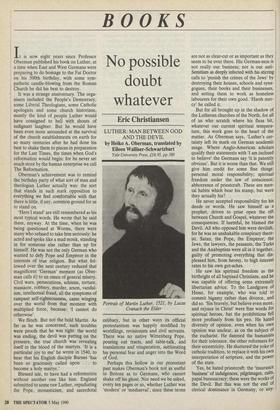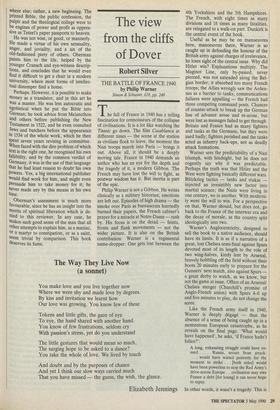BOOKS
No possible doubt whatever
Eric Christiansen
LUTHER: MAN BETWEEN GOD AND THE DEVIL by Heiko A. Oberman, translated by Eileen Walliser-Schwartzbart
Yale University Press, £18.95, pp.380
Portrait of Martin Luther, 1521, by Lucas Cranach the Elder
It is now eight years since Professor Oberman published his book on Luther, at a time when East and West Germans were preparing to do homage to the Fat Doctor on his 500th birthday, with some sym- pathetic candle-blowing from the Roman Church he did his best to destroy.
It was a strange anniversary. The orga- nisers included the People's Democracy, some Liberal Theologians, some Catholic apologists and some church historians, mostly the kind of people Luther would have consigned to hell with shouts of indignant laughter. But he would have been even more astounded at the survival of the church establishments on earth for so many centuries after he had done his best to shake them to pieces in preparation for the Last Times, the times when God's reformation would begin: for he never set much store by the human enterprise we call The Reformation.
Oberman's achievement was to remind the birthday party of what sort of man and theologian Luther actually was: the sort that stands in such stark opposition to everything we feel comfortable with that there is little, if any, common ground for us to stand on.
`Here I stand' are still remembered as his most typical words. He wrote that he said them, anyway. At the time, when he was being questioned at Worms, there were many who refused to take him seriously: he acted and spoke like a mad monk, standing in for someone else rather than up for himself. He was not the only German who wanted to defy Pope and Emperor in the interests of true religion. But what fol- lowed over the next century reduced that magnificent 'German' moment (as Ober- man calls it) to an omen of general misery. Civil wars, persecutions, schisms, torture, massacre, robbery, murder, arson, vandal- ism, intellectual fraud, all the symptoms of rampant self-righteousness, came winging over the world from that moment with multiplied force, because: 'I cannot do otherwise'.
We flinch. But not the bold Martin. As far as he was concerned, such troubles were proofs that he was right: the world was ending, the devil was putting on the pressure, the true church was revealing itself in the blood of the martyrs. 'It is a particular joy to me' he wrote in 1540, to hear that his English disciple Barnes 'has been so graciously called upon . . . to become a holy martyr.'
Blessed isle, to have had a reformation without another one like him. England submitted to some raw Luther, repudiating the Pope, monasticism, and sacerdotal celibacy, but in other ways its official protestantism was happily modified by worldlings, revisionists and civil servants. There was no native Wittenberg Pope, pouring out tracts, and table-talk, and translations and vituperation, sublimating his personal fear and anger into the Word of God.
Perhaps this hollow in our protestant past makes Oberman's book not as useful to Britons as to Germans, who cannot shake off his ghost. Nor need we be asked, every ten pages or so, whether Luther was `modern' or 'mediaeval', since these terms are not as clear-cut or as important as they seem to be over there. His German-ness is not really our business; nor is our anti- Semitism as deeply infected with his stirring calls to 'punish the crimes of the Jews' by destroying their houses, schools and syna- gogues, their books and their businesses, and setting them to work as homeless labourers for their own good. 'Harsh mer- cy' he called it.
But for all brought up in the shadow of the Lutheran churches of the North, for all of us who scratch where his fleas bit, whatever our current spiritual tempera- ture, this work goes to the heart of the matter. As Oberman says, 'Luther's cer- tainty left its mark on German academic usage. Where Anglo-American scholars qualify their statements with 'I am inclined to believe' the Germans say 'it is patently obvious'. But it is worse than that. We still give him credit for some fine things: personal moral responsibility; spiritual freedom under the law of conscience; abhorrence of priestcraft. These are men- tal habits which bear his stamp, but were they actually his?
He never accepted responsibility for his deeds or words. He saw himself as a prophet, driven to prise open the rift between Church and Gospel, whatever the consequences. If harmful, he blamed the Devil. All who opposed him were devilish, for he was an unshakable conspiracy theor- ist. Satan, the Pope, the Emperor, the Jews, the lawyers, the peasants, the Turks and the Anabaptists were all in it together, guilty of promoting everything that dis- pleased him, from heresy, to high interest rates to his own gut-aches.
He saw his spiritual freedom as the birthright of all baptised Christians, and he was capable of offering some extremely libertarian advice. To the Landgrave of Hesse, for example, who was told to commit bigamy rather than divorce, and did so. 'Sin bravely, but believe even more, and rejoice in Christ' were fine words for spiritual heroes, but the prohibitions fell more profusely from his pen. He hated diversity of opinion, even when his own opinion was unclear, as on the subject of the eucharist. He damned the humanists for their tolerance, the other reformers for their eccentricity. He shattered the yoke of catholic tradition, to replace it with his own interpretation of scripture, and the power of the state.
Yes, he hated priestcraft: the 'insurance business' of indulgences, pilgrimages, cults, papal bureaucracy; these were the works of the Devil. But this was not the end of clerical dominance in Germany, or any-
where else; rather, a new beginning. The printed Bible, the public confession, the pulpit and the theological college were to be engines of power and profit as oppres- sive as Tetzel's paper passports to heaven.
He was not wise, or good, or mannerly. He made a virtue of his own sensuality, anger, and joviality, and a sin of the old-fashioned piety of others. Oberman paints him to the life, helped by the younger Cranach and eye-witness descrip- tions, and concludes that he would even find it difficult to get a chair in a modern university, where most forms of intellec- tual distemper find a home.
Perhaps. However, it is possible to make money as a translator, and in this art he was a master. He was less autocratic and egotistical when he put the Bible into German; he took advice from Melancthon and others before publishing the New Testament in 1522, and he even consulted Jews and butchers before the appearance in 1534 of the whole work, which he then spent seven years revising in committee. When faced with the dire problem of which text is the right one, he recognised his own fallibility, and by the common verdict of Germany, it was in the use of that language that he had least reason to doubt his own Powers. Yes, a big international publisher would find work for him, and might even Persuade him to take money for it; he never made any by this means in his own time.
Oberman's assessment is much more favourable, since he has an insight into the Merits of spiritual liberation which is de- nied to this reviewer. In any case, he makes such good sense of the man that all other attempts to explain him, as a maniac, or a martyr to constipation, or as a saint, seem trivial by comparison. This book deserves its fame.



















































 Previous page
Previous page